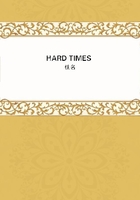
第14章 SLEARY'S HORSEMANSHIP(4)
'O my dear father, my good kind father, where are you gone? You are gone to try to do me some good, I know! You are gone away for my sake, I am sure! And how miserable and helpless you will be without me, poor, poor father, until you come back!' It was so pathetic to hear her saying many things of this kind, with her face turned upward, and her arms stretched out as if she were trying to stop his departing shadow and embrace it, that no one spoke a word until Mr. Bounderby (growing impatient) took the case in hand.
'Now, good people all,' said he, 'this is wanton waste of time.
Let the girl understand the fact. Let her take it from me, if you like, who have been run away from, myself. Here, what's your name!
Your father has absconded - deserted you - and you mustn't expect to see him again as long as you live.'
They cared so little for plain Fact, these people, and were in that advanced state of degeneracy on the subject, that instead of being impressed by the speaker's strong common sense, they took it in extraordinary dudgeon. The men muttered 'Shame!' and the women 'Brute!' and Sleary, in some haste, communicated the following hint, apart to Mr. Bounderby.
'I tell you what, Thquire. To thpeak plain to you, my opinion ith that you had better cut it thort, and drop it. They're a very good natur'd people, my people, but they're accuthtomed to be quick in their movementh; and if you don't act upon my advithe, I'm damned if I don't believe they'll pith you out o' winder.'
Mr. Bounderby being restrained by this mild suggestion, Mr.
Gradgrind found an opening for his eminently practical exposition of the subject.
'It is of no moment,' said he, 'whether this person is to be expected back at any time, or the contrary. He is gone away, and there is no present expectation of his return. That, I believe, is agreed on all hands.'
'Thath agreed, Thquire. Thick to that!' From Sleary.
'Well then. I, who came here to inform the father of the poor girl, Jupe, that she could not be received at the school any more, in consequence of there being practical objections, into which Ineed not enter, to the reception there of the children of persons so employed, am prepared in these altered circumstances to make a proposal. I am willing to take charge of you, Jupe, and to educate you, and provide for you. The only condition (over and above your good behaviour) I make is, that you decide now, at once, whether to accompany me or remain here. Also, that if you accompany me now, it is understood that you communicate no more with any of your friends who are here present. These observations comprise the whole of the case.'
'At the thame time,' said Sleary, 'I mutht put in my word, Thquire, tho that both thides of the banner may be equally theen. If you like, Thethilia, to be prentitht, you know the natur of the work and you know your companionth. Emma Gordon, in whothe lap you're a lying at prethent, would be a mother to you, and Joth'phine would be a thithter to you. I don't pretend to be of the angel breed myself, and I don't thay but what, when you mith'd your tip, you'd find me cut up rough, and thwear an oath or two at you. But what Ithay, Thquire, ith, that good tempered or bad tempered, I never did a horthe a injury yet, no more than thwearing at him went, and that I don't expect I thall begin otherwithe at my time of life, with a rider. I never wath much of a Cackler, Thquire, and I have thed my thay.'
The latter part of this speech was addressed to Mr. Gradgrind, who received it with a grave inclination of his head, and then remarked:
'The only observation I will make to you, Jupe, in the way of influencing your decision, is, that it is highly desirable to have a sound practical education, and that even your father himself (from what I understand) appears, on your behalf, to have known and felt that much.'
The last words had a visible effect upon her. She stopped in her wild crying, a little detached herself from Emma Gordon, and turned her face full upon her patron. The whole company perceived the force of the change, and drew a long breath together, that plainly said, 'she will go!'
'Be sure you know your own mind, Jupe,' Mr. Gradgrind cautioned her; 'I say no more. Be sure you know your own mind!'
'When father comes back,' cried the girl, bursting into tears again after a minute's silence, 'how will he ever find me if I go away!'
'You may be quite at ease,' said Mr. Gradgrind, calmly; he worked out the whole matter like a sum: 'you may be quite at ease, Jupe, on that score. In such a case, your father, I apprehend, must find out Mr. - '